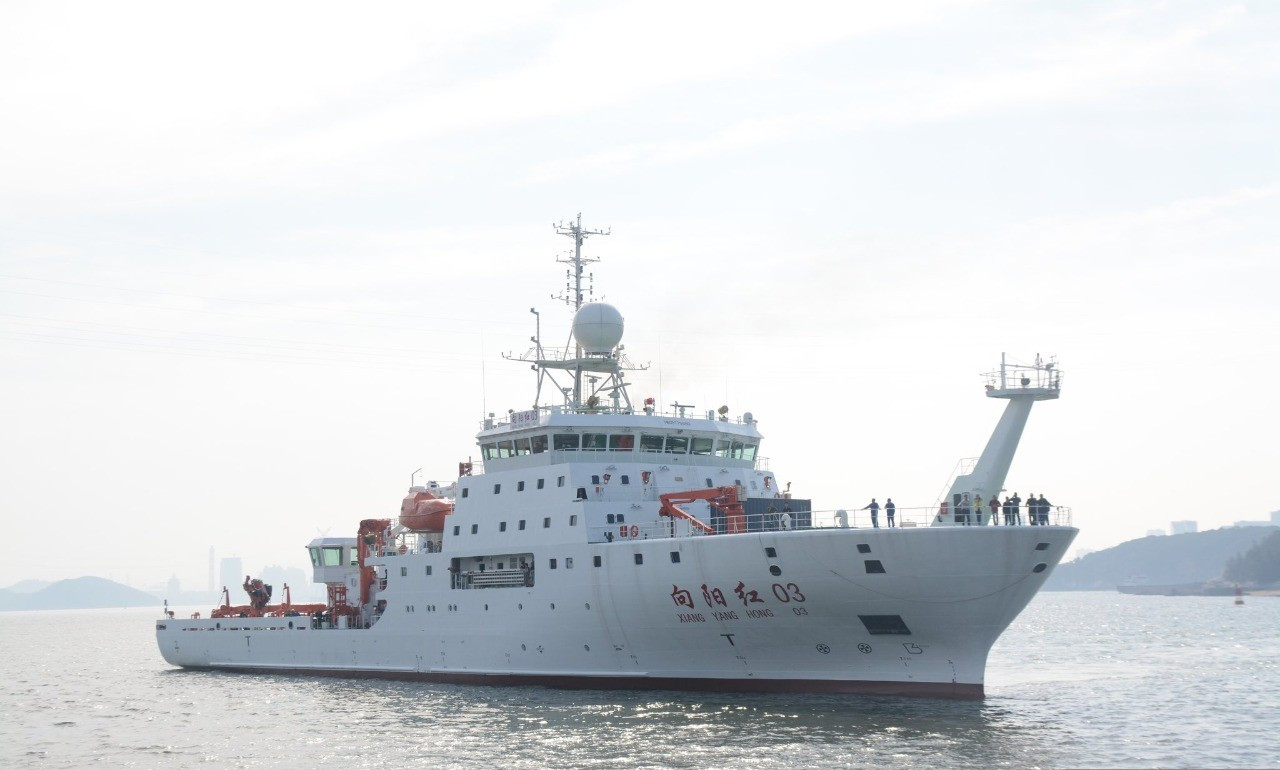Bakamla intercepts Chinese research vessel in Sunda Strait
Incident occurred weeks after discovery of sea glider in S. Sulawesi
Change Size

T
he Maritime Security Agency (Bakamla) intercepted a Chinese research vessel on Wednesday evening whose automatic tracking system had been inactive at three separate times as it passed through Indonesian waters.
“KN Pulau Nipah 321 intercepted Chinese research vessel Xiang Yang Hong 03 on Wednesday evening at about 8 p.m. while it was passing through the Sunda Strait,” Bakamla chief spokesman Col. Wisnu Pramandita said in a statement on Friday.
He noted that the Chinese vessel was traveling at 10.9 knots and was heading southwest.
The ship’s Automatic Identification System (AIS), Wisnu added, was inactive during three intervals as it passed through Indonesian Archipelagic Sea Lane (ALKI) I – in the North Natuna Sea, the South Natuna Sea and the Karimata Strait.
An AIS is a tracking system that provides information on a ship’s position, bearing and speed at a given time for maritime safety.
Transportation Ministerial Regulation No. PM7/2019 requires all ships, both foreign and Indonesian, to have an activated AIS while in Indonesian waters.
If a ship’s AIS is not working, the captain must inform coastal radio stations or vessel traffic service (VTS) stations.
The ship must also record the incident in its logbook to be reported to the harbor master.
Read also: Navy to propose stricter regulations for research vessels, UUV
Xian Yang Hong 03 departed from Sanya in Hainan, China, on Jan. 6, according to vessel tracking website marinetraffic.com, with an estimated arrival at its home port of Xiamen, Fujian, on Feb. 18.
The website reports that the research vessel was built in 2016 and is 99.8 meters long.
The incident took place just weeks after the discovery of an unmanned underwater vehicle, also known as a sea glider, in Selayar Islands regency, South Sulawesi, in late December 2020.
While many experts said that the sea glider was of Chinese origin, the Indonesian Navy said on Jan. 4 that more investigation was needed to determine its origin.
After receiving a report of an unidentified vessel, Bakamla operations director Cdre. Suwito ordered the commanding officer of the 80-meter patrol ship KN Pulau Nipah, Lt. Col. Anto Hartanto, to pursue the ship.
Suwito was leading Bakamla’s search and rescue team off the coast of Lancang Island, Thousand Islands regency, Jakarta, looking for victims and wreckage of a Sriwijaya Air plane that had crashed into the Java Sea just four minutes after taking off from Soekarno-Hatta International Airport in Tangerang, Banten.
Suwito coordinated with the commanding officer of the search and rescue team to release KN Pulau Nipah to intercept the Chinese vessel.
KN Pulau Nipah departed at 9:03 a.m. on Wednesday and arrived in the Sunda Strait at 1:40 p.m. the same day, where the Chinese survey ship was detected 40 nautical miles away traveling south at a speed of 9 knots.
Read also: China, ASEAN should prevent "external disruption" in South China Sea: Wang Yi
At about 8 p.m., the gap had closed to 10 nautical miles and KN Pulau Nipah sent a radio message to which the Chinese research vessel responded.
“Xiang Yang Hong 03 claimed that its AIS device had malfunctioned during the three periods when the AIS was not active,” Wisnu said.
The Chinese research vessel said it had departed China for the Indian Ocean and had passed though Indonesian waters under archipelagic sea lane rights in accordance with the United Nations Convention on the Law of the Sea (UNCLOS).
KN Pulau Nipah could not inspect the vessel further because of inclement weather but shadowed the ship until it was outside the Indonesian exclusive economic zone (EEZ).
By about 9 p.m., Xian Yang Hong 03 had left the EEZ. KN Pulau Nipah then returned to the joint search and rescue area. The patrol boat arrived at about 8 a.m. on Thursday and continued the search for the remains of the ill-fated flight SJ182 to Supadio International Airport in Pontianak.
The incident adds to a long list of encounters around the Natuna Sea, where China has asserted that it has “legitimate rights and interests in the relevant waters”.
In September of last year, Bakamla drove off a Chinese coast guard vessel that had entered the Indonesian EEZ in the North Natuna Sea without the country’s authorization. The Chinese coast guard insisted that it had the right to patrol within the nine-dash line, which the country claims forms the boundary of its traditional fishing grounds in the South China Sea.
Read also: Natuna incident does not affect Chinese investment in Indonesia: BKPM
China expressed interest in “managing disputes properly through bilateral dialogue”, a proposal Indonesia flatly declined.
The South China Sea issue continues to overshadow the warming relations between Indonesia and China as they work closely to mitigate the impact of COVID-19 through health and economic cooperation.
On the same day as the Xian Yang Hong 03 incident, Chinese Foreign Minister Wang Yi visited Indonesia as part of a Southeast Asian tour. He met with his Indonesian counterpart Retno LP Marsudi and Coordinating Maritime Affairs and Investment Minister Luhut Pandjaitan. He also visited with President Joko “Jokowi” Widodo.
After the meetings, Retno reiterated the importance of regional peace and stability, especially in the South China Sea. Wang noted that both countries were the biggest coastal states of the South China Sea and that they continued to “abide by the principle of friendly consultation”.
Wang hailed the “broad common interests” of the two countries as they worked to combine China’s Belt and Road Initiative and Indonesia’s Global Maritime Fulcrum.









